Legal Framework for Managers: Contract Law, Minors, and Agreements
VerifiedAdded on 2023/04/08
|7
|1620
|52
Homework Assignment
AI Summary
This assignment, titled "Legal Framework for Managers," delves into the complexities of contract law within a business context. The first question examines a scenario where a minor, a 17-year-old jockey, enters into an employment contract with a racing stable. The analysis centers on whether the contract is legally binding, considering the minor's age and the potential for the contract to be voidable. The assignment explores relevant legal principles, including the capacity to contract, the exceptions for necessaries and beneficial service contracts, and relevant case law such as Nash v. Inman and Doyle v. White City Stadium Ltd. The conclusion asserts that the contract is binding because it benefits the minor and lacks unfair terms. The second question addresses the legal impact of a verbal assurance made by the Chief Trainer before the written contract was enacted, regarding the possibility of opting out after one year. Applying the parole evidence rule, the assignment concludes that the verbal assurance is not legally significant because it was not included in the written agreement, thereby not affecting the original conclusion. The assignment references various legal textbooks and publications to support its analysis.
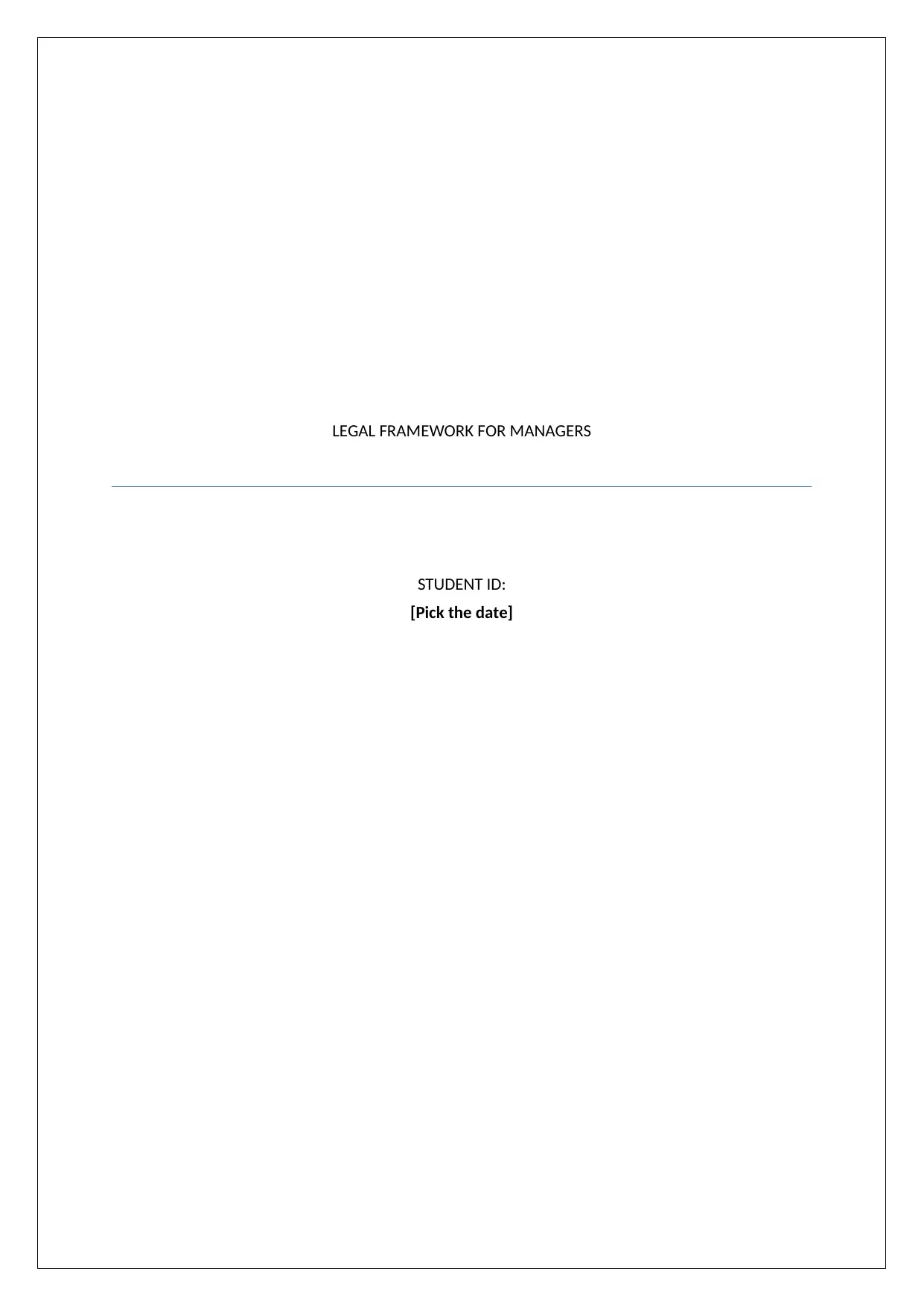
LEGAL FRAMEWORK FOR MANAGERS
STUDENT ID:
[Pick the date]
STUDENT ID:
[Pick the date]
Paraphrase This Document
Need a fresh take? Get an instant paraphrase of this document with our AI Paraphraser
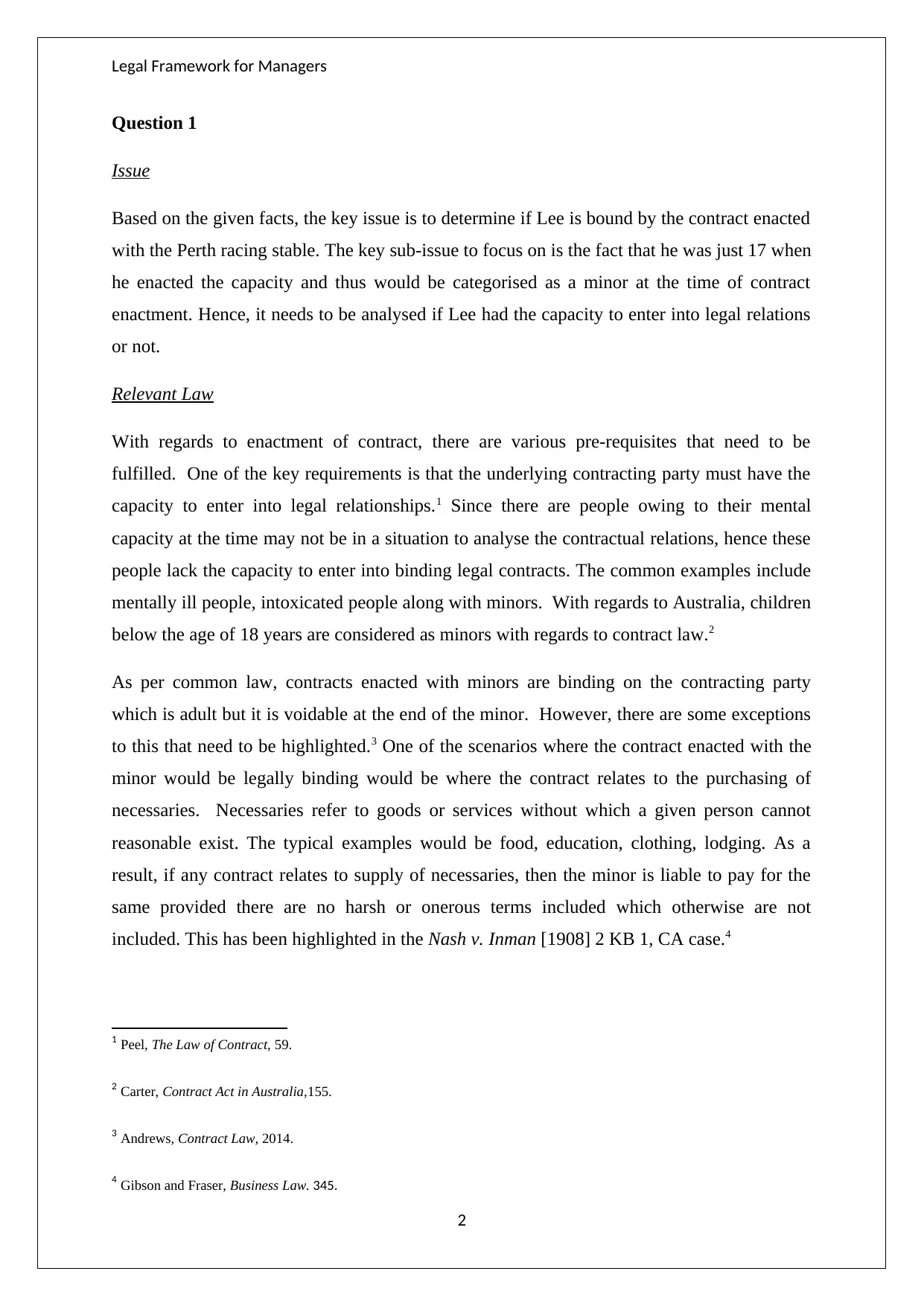
Legal Framework for Managers
Question 1
Issue
Based on the given facts, the key issue is to determine if Lee is bound by the contract enacted
with the Perth racing stable. The key sub-issue to focus on is the fact that he was just 17 when
he enacted the capacity and thus would be categorised as a minor at the time of contract
enactment. Hence, it needs to be analysed if Lee had the capacity to enter into legal relations
or not.
Relevant Law
With regards to enactment of contract, there are various pre-requisites that need to be
fulfilled. One of the key requirements is that the underlying contracting party must have the
capacity to enter into legal relationships.1 Since there are people owing to their mental
capacity at the time may not be in a situation to analyse the contractual relations, hence these
people lack the capacity to enter into binding legal contracts. The common examples include
mentally ill people, intoxicated people along with minors. With regards to Australia, children
below the age of 18 years are considered as minors with regards to contract law.2
As per common law, contracts enacted with minors are binding on the contracting party
which is adult but it is voidable at the end of the minor. However, there are some exceptions
to this that need to be highlighted.3 One of the scenarios where the contract enacted with the
minor would be legally binding would be where the contract relates to the purchasing of
necessaries. Necessaries refer to goods or services without which a given person cannot
reasonable exist. The typical examples would be food, education, clothing, lodging. As a
result, if any contract relates to supply of necessaries, then the minor is liable to pay for the
same provided there are no harsh or onerous terms included which otherwise are not
included. This has been highlighted in the Nash v. Inman [1908] 2 KB 1, CA case.4
1 Peel, The Law of Contract, 59.
2 Carter, Contract Act in Australia,155.
3 Andrews, Contract Law, 2014.
4 Gibson and Fraser, Business Law. 345.
2
Question 1
Issue
Based on the given facts, the key issue is to determine if Lee is bound by the contract enacted
with the Perth racing stable. The key sub-issue to focus on is the fact that he was just 17 when
he enacted the capacity and thus would be categorised as a minor at the time of contract
enactment. Hence, it needs to be analysed if Lee had the capacity to enter into legal relations
or not.
Relevant Law
With regards to enactment of contract, there are various pre-requisites that need to be
fulfilled. One of the key requirements is that the underlying contracting party must have the
capacity to enter into legal relationships.1 Since there are people owing to their mental
capacity at the time may not be in a situation to analyse the contractual relations, hence these
people lack the capacity to enter into binding legal contracts. The common examples include
mentally ill people, intoxicated people along with minors. With regards to Australia, children
below the age of 18 years are considered as minors with regards to contract law.2
As per common law, contracts enacted with minors are binding on the contracting party
which is adult but it is voidable at the end of the minor. However, there are some exceptions
to this that need to be highlighted.3 One of the scenarios where the contract enacted with the
minor would be legally binding would be where the contract relates to the purchasing of
necessaries. Necessaries refer to goods or services without which a given person cannot
reasonable exist. The typical examples would be food, education, clothing, lodging. As a
result, if any contract relates to supply of necessaries, then the minor is liable to pay for the
same provided there are no harsh or onerous terms included which otherwise are not
included. This has been highlighted in the Nash v. Inman [1908] 2 KB 1, CA case.4
1 Peel, The Law of Contract, 59.
2 Carter, Contract Act in Australia,155.
3 Andrews, Contract Law, 2014.
4 Gibson and Fraser, Business Law. 345.
2
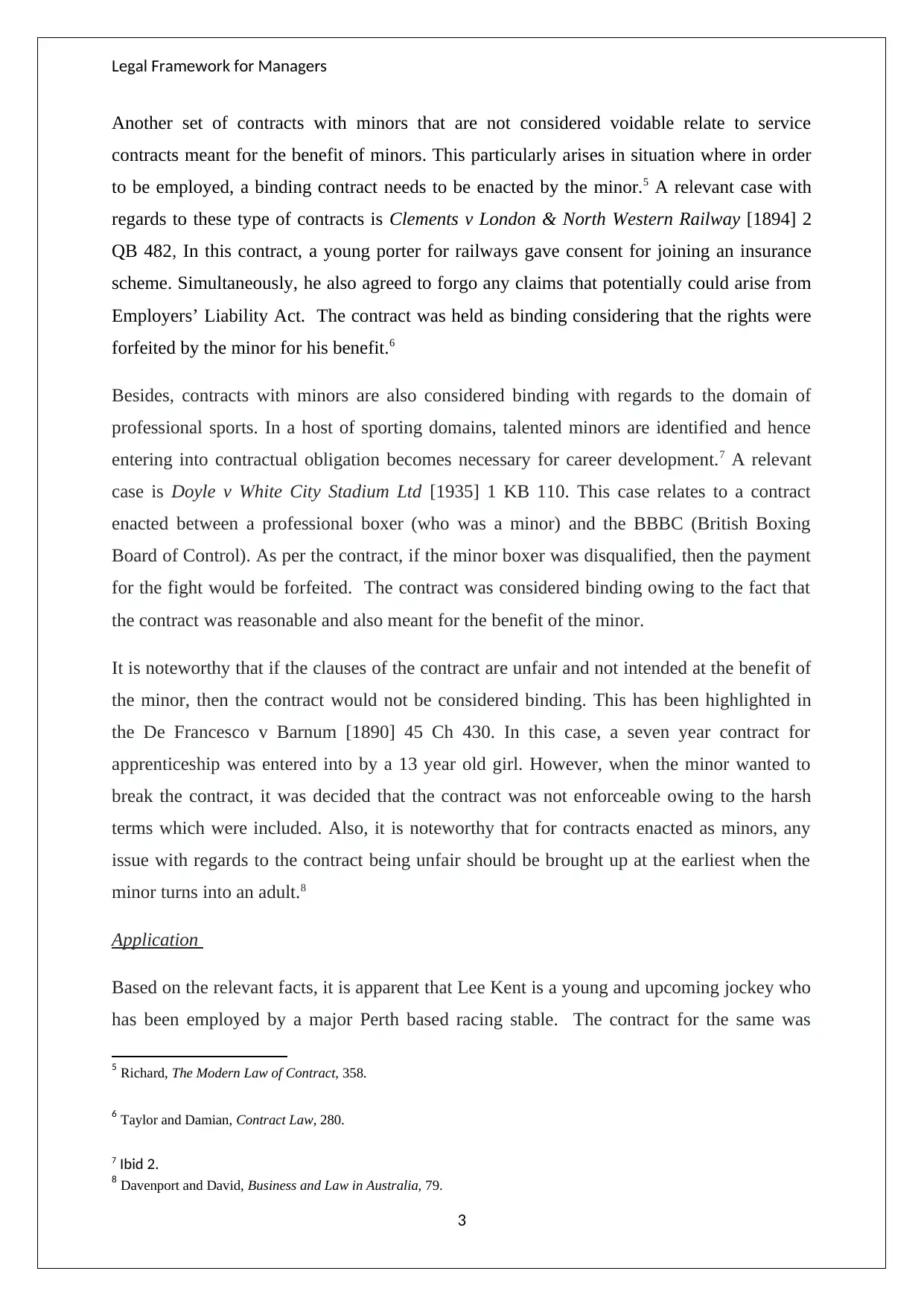
Legal Framework for Managers
Another set of contracts with minors that are not considered voidable relate to service
contracts meant for the benefit of minors. This particularly arises in situation where in order
to be employed, a binding contract needs to be enacted by the minor.5 A relevant case with
regards to these type of contracts is Clements v London & North Western Railway [1894] 2
QB 482, In this contract, a young porter for railways gave consent for joining an insurance
scheme. Simultaneously, he also agreed to forgo any claims that potentially could arise from
Employers’ Liability Act. The contract was held as binding considering that the rights were
forfeited by the minor for his benefit.6
Besides, contracts with minors are also considered binding with regards to the domain of
professional sports. In a host of sporting domains, talented minors are identified and hence
entering into contractual obligation becomes necessary for career development.7 A relevant
case is Doyle v White City Stadium Ltd [1935] 1 KB 110. This case relates to a contract
enacted between a professional boxer (who was a minor) and the BBBC (British Boxing
Board of Control). As per the contract, if the minor boxer was disqualified, then the payment
for the fight would be forfeited. The contract was considered binding owing to the fact that
the contract was reasonable and also meant for the benefit of the minor.
It is noteworthy that if the clauses of the contract are unfair and not intended at the benefit of
the minor, then the contract would not be considered binding. This has been highlighted in
the De Francesco v Barnum [1890] 45 Ch 430. In this case, a seven year contract for
apprenticeship was entered into by a 13 year old girl. However, when the minor wanted to
break the contract, it was decided that the contract was not enforceable owing to the harsh
terms which were included. Also, it is noteworthy that for contracts enacted as minors, any
issue with regards to the contract being unfair should be brought up at the earliest when the
minor turns into an adult.8
Application
Based on the relevant facts, it is apparent that Lee Kent is a young and upcoming jockey who
has been employed by a major Perth based racing stable. The contract for the same was
5 Richard, The Modern Law of Contract, 358.
6 Taylor and Damian, Contract Law, 280.
7 Ibid 2.
8 Davenport and David, Business and Law in Australia, 79.
3
Another set of contracts with minors that are not considered voidable relate to service
contracts meant for the benefit of minors. This particularly arises in situation where in order
to be employed, a binding contract needs to be enacted by the minor.5 A relevant case with
regards to these type of contracts is Clements v London & North Western Railway [1894] 2
QB 482, In this contract, a young porter for railways gave consent for joining an insurance
scheme. Simultaneously, he also agreed to forgo any claims that potentially could arise from
Employers’ Liability Act. The contract was held as binding considering that the rights were
forfeited by the minor for his benefit.6
Besides, contracts with minors are also considered binding with regards to the domain of
professional sports. In a host of sporting domains, talented minors are identified and hence
entering into contractual obligation becomes necessary for career development.7 A relevant
case is Doyle v White City Stadium Ltd [1935] 1 KB 110. This case relates to a contract
enacted between a professional boxer (who was a minor) and the BBBC (British Boxing
Board of Control). As per the contract, if the minor boxer was disqualified, then the payment
for the fight would be forfeited. The contract was considered binding owing to the fact that
the contract was reasonable and also meant for the benefit of the minor.
It is noteworthy that if the clauses of the contract are unfair and not intended at the benefit of
the minor, then the contract would not be considered binding. This has been highlighted in
the De Francesco v Barnum [1890] 45 Ch 430. In this case, a seven year contract for
apprenticeship was entered into by a 13 year old girl. However, when the minor wanted to
break the contract, it was decided that the contract was not enforceable owing to the harsh
terms which were included. Also, it is noteworthy that for contracts enacted as minors, any
issue with regards to the contract being unfair should be brought up at the earliest when the
minor turns into an adult.8
Application
Based on the relevant facts, it is apparent that Lee Kent is a young and upcoming jockey who
has been employed by a major Perth based racing stable. The contract for the same was
5 Richard, The Modern Law of Contract, 358.
6 Taylor and Damian, Contract Law, 280.
7 Ibid 2.
8 Davenport and David, Business and Law in Australia, 79.
3
⊘ This is a preview!⊘
Do you want full access?
Subscribe today to unlock all pages.

Trusted by 1+ million students worldwide
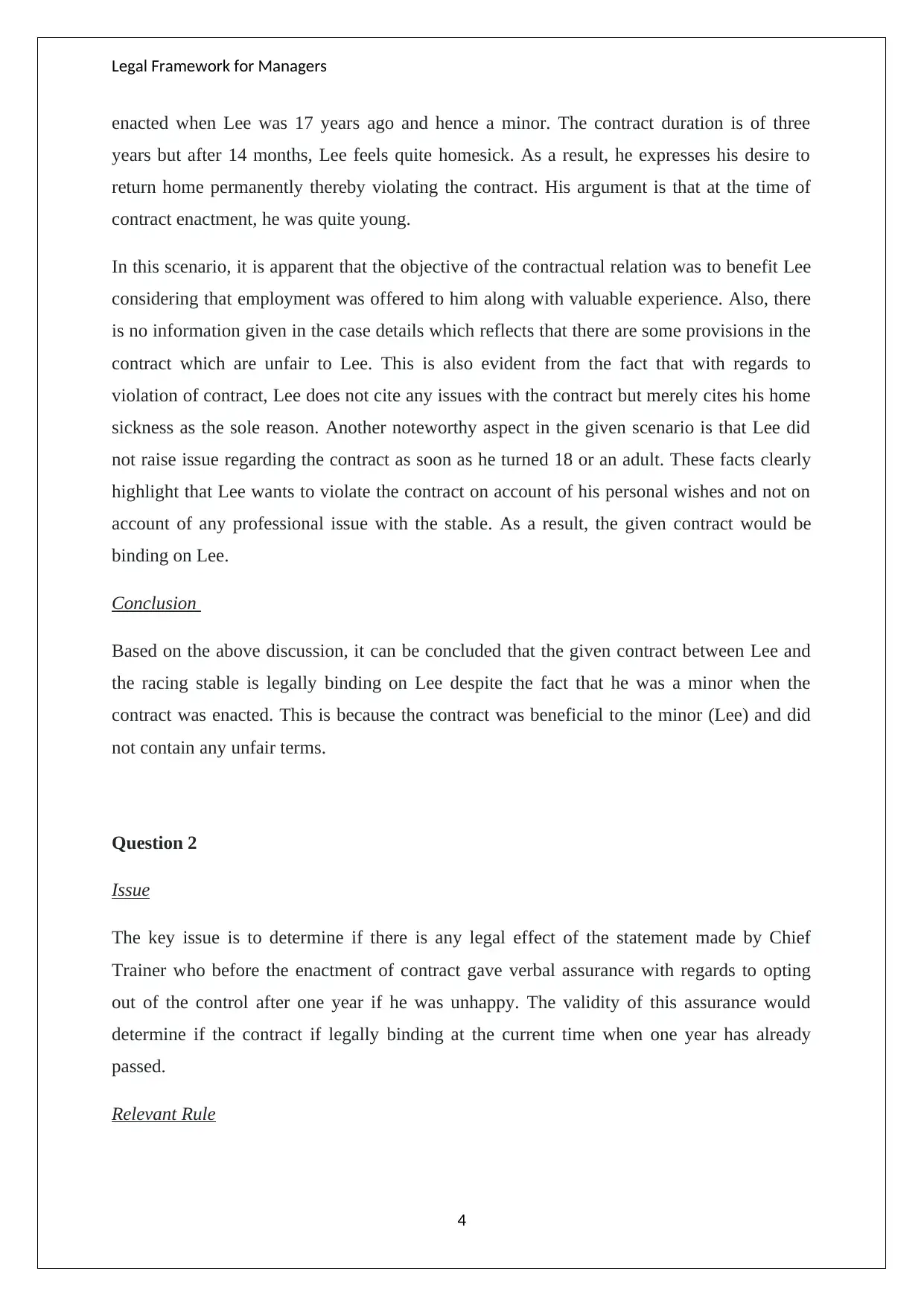
Legal Framework for Managers
enacted when Lee was 17 years ago and hence a minor. The contract duration is of three
years but after 14 months, Lee feels quite homesick. As a result, he expresses his desire to
return home permanently thereby violating the contract. His argument is that at the time of
contract enactment, he was quite young.
In this scenario, it is apparent that the objective of the contractual relation was to benefit Lee
considering that employment was offered to him along with valuable experience. Also, there
is no information given in the case details which reflects that there are some provisions in the
contract which are unfair to Lee. This is also evident from the fact that with regards to
violation of contract, Lee does not cite any issues with the contract but merely cites his home
sickness as the sole reason. Another noteworthy aspect in the given scenario is that Lee did
not raise issue regarding the contract as soon as he turned 18 or an adult. These facts clearly
highlight that Lee wants to violate the contract on account of his personal wishes and not on
account of any professional issue with the stable. As a result, the given contract would be
binding on Lee.
Conclusion
Based on the above discussion, it can be concluded that the given contract between Lee and
the racing stable is legally binding on Lee despite the fact that he was a minor when the
contract was enacted. This is because the contract was beneficial to the minor (Lee) and did
not contain any unfair terms.
Question 2
Issue
The key issue is to determine if there is any legal effect of the statement made by Chief
Trainer who before the enactment of contract gave verbal assurance with regards to opting
out of the control after one year if he was unhappy. The validity of this assurance would
determine if the contract if legally binding at the current time when one year has already
passed.
Relevant Rule
4
enacted when Lee was 17 years ago and hence a minor. The contract duration is of three
years but after 14 months, Lee feels quite homesick. As a result, he expresses his desire to
return home permanently thereby violating the contract. His argument is that at the time of
contract enactment, he was quite young.
In this scenario, it is apparent that the objective of the contractual relation was to benefit Lee
considering that employment was offered to him along with valuable experience. Also, there
is no information given in the case details which reflects that there are some provisions in the
contract which are unfair to Lee. This is also evident from the fact that with regards to
violation of contract, Lee does not cite any issues with the contract but merely cites his home
sickness as the sole reason. Another noteworthy aspect in the given scenario is that Lee did
not raise issue regarding the contract as soon as he turned 18 or an adult. These facts clearly
highlight that Lee wants to violate the contract on account of his personal wishes and not on
account of any professional issue with the stable. As a result, the given contract would be
binding on Lee.
Conclusion
Based on the above discussion, it can be concluded that the given contract between Lee and
the racing stable is legally binding on Lee despite the fact that he was a minor when the
contract was enacted. This is because the contract was beneficial to the minor (Lee) and did
not contain any unfair terms.
Question 2
Issue
The key issue is to determine if there is any legal effect of the statement made by Chief
Trainer who before the enactment of contract gave verbal assurance with regards to opting
out of the control after one year if he was unhappy. The validity of this assurance would
determine if the contract if legally binding at the current time when one year has already
passed.
Relevant Rule
4
Paraphrase This Document
Need a fresh take? Get an instant paraphrase of this document with our AI Paraphraser
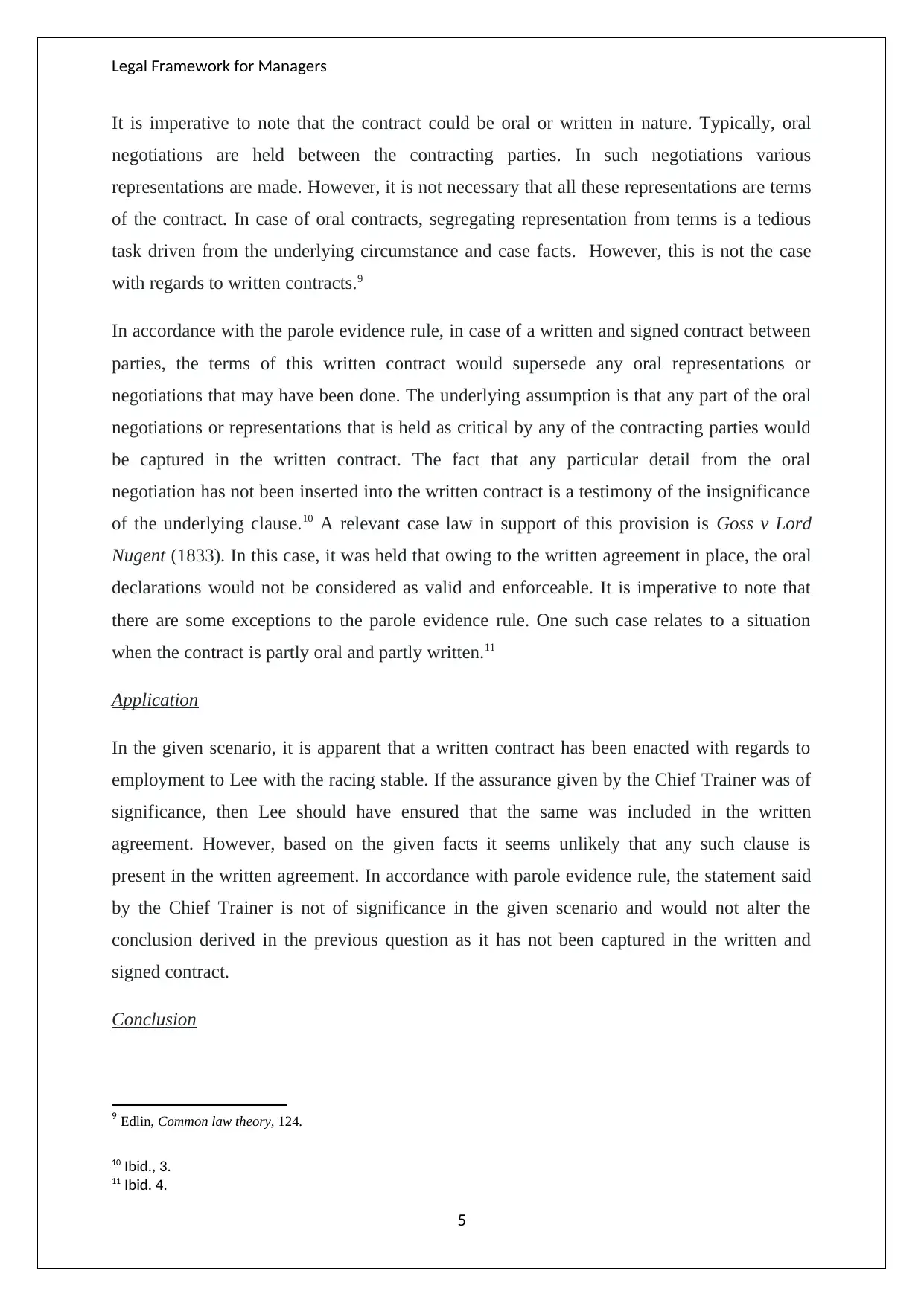
Legal Framework for Managers
It is imperative to note that the contract could be oral or written in nature. Typically, oral
negotiations are held between the contracting parties. In such negotiations various
representations are made. However, it is not necessary that all these representations are terms
of the contract. In case of oral contracts, segregating representation from terms is a tedious
task driven from the underlying circumstance and case facts. However, this is not the case
with regards to written contracts.9
In accordance with the parole evidence rule, in case of a written and signed contract between
parties, the terms of this written contract would supersede any oral representations or
negotiations that may have been done. The underlying assumption is that any part of the oral
negotiations or representations that is held as critical by any of the contracting parties would
be captured in the written contract. The fact that any particular detail from the oral
negotiation has not been inserted into the written contract is a testimony of the insignificance
of the underlying clause.10 A relevant case law in support of this provision is Goss v Lord
Nugent (1833). In this case, it was held that owing to the written agreement in place, the oral
declarations would not be considered as valid and enforceable. It is imperative to note that
there are some exceptions to the parole evidence rule. One such case relates to a situation
when the contract is partly oral and partly written.11
Application
In the given scenario, it is apparent that a written contract has been enacted with regards to
employment to Lee with the racing stable. If the assurance given by the Chief Trainer was of
significance, then Lee should have ensured that the same was included in the written
agreement. However, based on the given facts it seems unlikely that any such clause is
present in the written agreement. In accordance with parole evidence rule, the statement said
by the Chief Trainer is not of significance in the given scenario and would not alter the
conclusion derived in the previous question as it has not been captured in the written and
signed contract.
Conclusion
9 Edlin, Common law theory, 124.
10 Ibid., 3.
11 Ibid. 4.
5
It is imperative to note that the contract could be oral or written in nature. Typically, oral
negotiations are held between the contracting parties. In such negotiations various
representations are made. However, it is not necessary that all these representations are terms
of the contract. In case of oral contracts, segregating representation from terms is a tedious
task driven from the underlying circumstance and case facts. However, this is not the case
with regards to written contracts.9
In accordance with the parole evidence rule, in case of a written and signed contract between
parties, the terms of this written contract would supersede any oral representations or
negotiations that may have been done. The underlying assumption is that any part of the oral
negotiations or representations that is held as critical by any of the contracting parties would
be captured in the written contract. The fact that any particular detail from the oral
negotiation has not been inserted into the written contract is a testimony of the insignificance
of the underlying clause.10 A relevant case law in support of this provision is Goss v Lord
Nugent (1833). In this case, it was held that owing to the written agreement in place, the oral
declarations would not be considered as valid and enforceable. It is imperative to note that
there are some exceptions to the parole evidence rule. One such case relates to a situation
when the contract is partly oral and partly written.11
Application
In the given scenario, it is apparent that a written contract has been enacted with regards to
employment to Lee with the racing stable. If the assurance given by the Chief Trainer was of
significance, then Lee should have ensured that the same was included in the written
agreement. However, based on the given facts it seems unlikely that any such clause is
present in the written agreement. In accordance with parole evidence rule, the statement said
by the Chief Trainer is not of significance in the given scenario and would not alter the
conclusion derived in the previous question as it has not been captured in the written and
signed contract.
Conclusion
9 Edlin, Common law theory, 124.
10 Ibid., 3.
11 Ibid. 4.
5
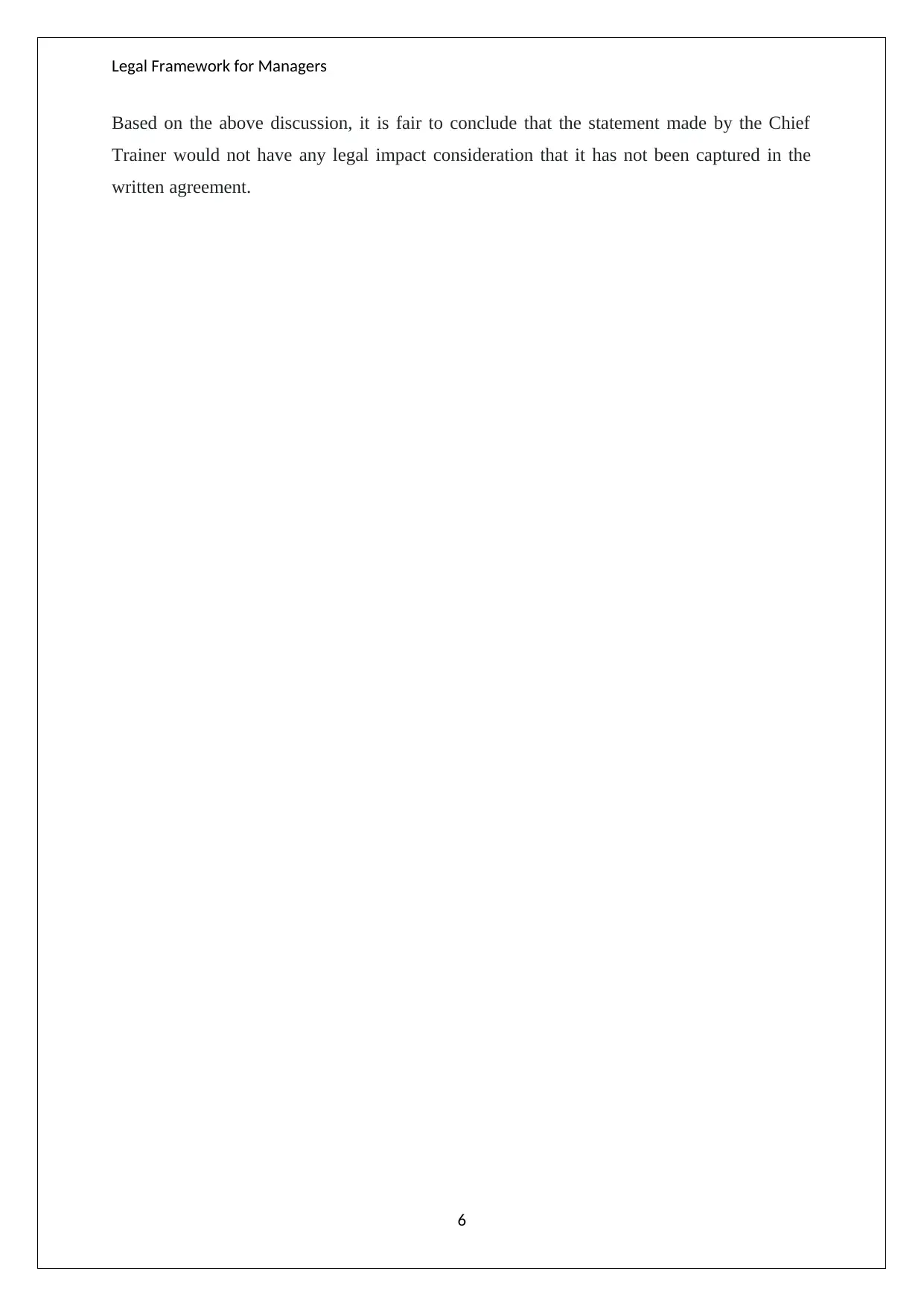
Legal Framework for Managers
Based on the above discussion, it is fair to conclude that the statement made by the Chief
Trainer would not have any legal impact consideration that it has not been captured in the
written agreement.
6
Based on the above discussion, it is fair to conclude that the statement made by the Chief
Trainer would not have any legal impact consideration that it has not been captured in the
written agreement.
6
⊘ This is a preview!⊘
Do you want full access?
Subscribe today to unlock all pages.

Trusted by 1+ million students worldwide
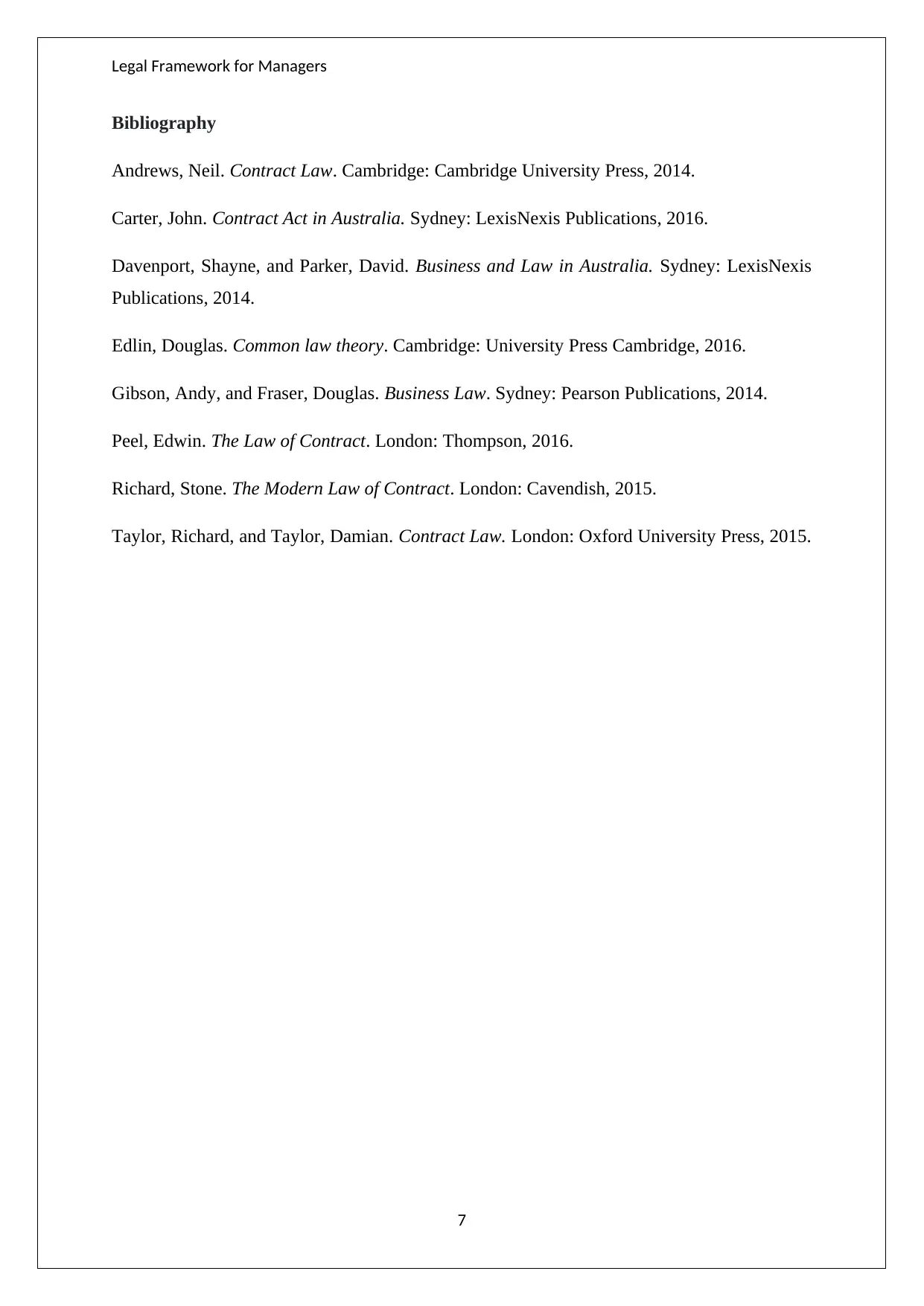
Legal Framework for Managers
Bibliography
Andrews, Neil. Contract Law. Cambridge: Cambridge University Press, 2014.
Carter, John. Contract Act in Australia. Sydney: LexisNexis Publications, 2016.
Davenport, Shayne, and Parker, David. Business and Law in Australia. Sydney: LexisNexis
Publications, 2014.
Edlin, Douglas. Common law theory. Cambridge: University Press Cambridge, 2016.
Gibson, Andy, and Fraser, Douglas. Business Law. Sydney: Pearson Publications, 2014.
Peel, Edwin. The Law of Contract. London: Thompson, 2016.
Richard, Stone. The Modern Law of Contract. London: Cavendish, 2015.
Taylor, Richard, and Taylor, Damian. Contract Law. London: Oxford University Press, 2015.
7
Bibliography
Andrews, Neil. Contract Law. Cambridge: Cambridge University Press, 2014.
Carter, John. Contract Act in Australia. Sydney: LexisNexis Publications, 2016.
Davenport, Shayne, and Parker, David. Business and Law in Australia. Sydney: LexisNexis
Publications, 2014.
Edlin, Douglas. Common law theory. Cambridge: University Press Cambridge, 2016.
Gibson, Andy, and Fraser, Douglas. Business Law. Sydney: Pearson Publications, 2014.
Peel, Edwin. The Law of Contract. London: Thompson, 2016.
Richard, Stone. The Modern Law of Contract. London: Cavendish, 2015.
Taylor, Richard, and Taylor, Damian. Contract Law. London: Oxford University Press, 2015.
7
1 out of 7
Related Documents
Your All-in-One AI-Powered Toolkit for Academic Success.
+13062052269
info@desklib.com
Available 24*7 on WhatsApp / Email
![[object Object]](/_next/static/media/star-bottom.7253800d.svg)
Unlock your academic potential
Copyright © 2020–2026 A2Z Services. All Rights Reserved. Developed and managed by ZUCOL.





